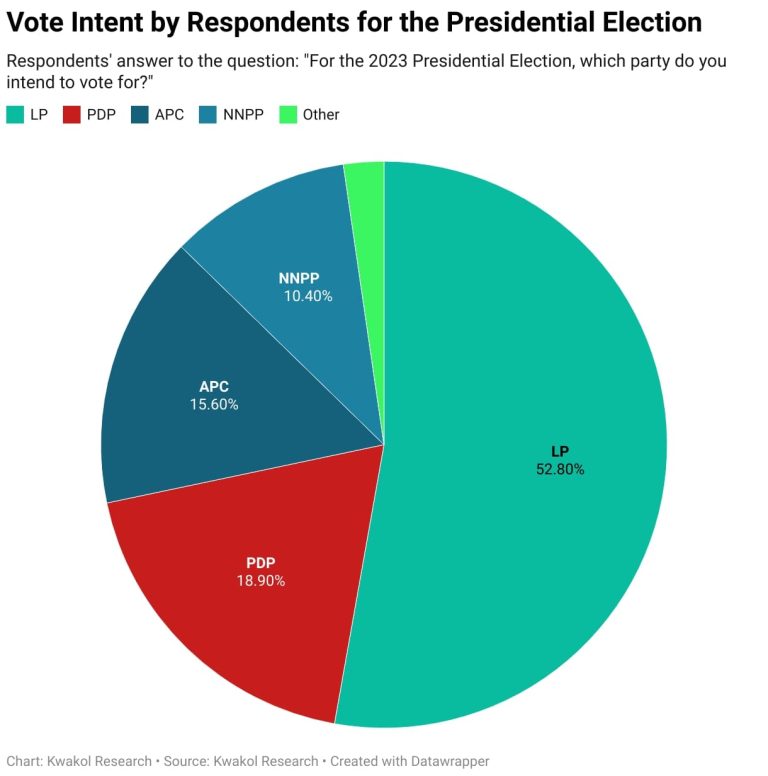
The presidential candidate of the Labour Party (LP), Peter Obi is the most popular candidate among the major contenders seeking to become the nation’s next president, a new poll conducted by the Kwakol Research Institute has revealed.
The research agency used several parameters to arrive at its conclusion — for example, the issue of income classification, educational background, work status, and sex were factors used in arriving at its conclusion.
According to the poll, the LP presidential candidate was the ideal choice for more than 50 percent of respondents, including women, the unemployed, civil servants, private sector participants, and students, especially those in tertiary institutions.
Unlike most polls, Kwakol gathered most of its responses from rural dwellers.
“It is important to note that, unlike the majority of the polls in Nigeria, we polled more registered voters in rural Nigeria than registered voters in semi-urban Nigeria and urban Nigeria, respectively,” it stated.
In summation, 52.80 percent of respondents said that they would vote for the Labour Party, 18.9 percent said they would vote for the Peoples Democratic Party (PDP), 15.6 percent said they would vote for the All Progressives Congress, and 10.4 percent said that they would vote for the New Nigeria Peoples Party (NNPP).
It must be pertinent to note that respondents in the exercise cut across the six geopolitical zones and income backgrounds. The spread of the poll had 45 percent of respondents residing in rural areas, while semi-urban areas narrowly edged out urban respondents by a point, with them taking up 28 percent and 27 percent, respectively.
A further breakdown showed that the agency agreed with popular census figures of the numerical strength of the North-West and South-West geopolitical zones, with the spread resulting in 25.27 percent and 19 percent, respectively, while the South-South and South-East ended up with 13.44 percent and 12.13 percent, respectively.
Obi gained more acceptance with young people who fell within the age bracket of 18 to 69, with 56 percent of those within the age range of 35 to 49 years and with valid Permanent Voter Cards (PVCs) saying that they would vote for him at the February 25 election.
Across the occupational background divide, over 70 percent of respondents working in the private sector said that they would vote for Obi and his party (LP). This performance was closely followed by civil servants, whose 66.9 percent of respondents said that they would vote for him as president in next week’s Saturday election. 53.4 percent of the students said they would vote for him. This was closely followed by 52.3 percent of unemployed respondents who said they would vote for him.
Another interesting revelation from the Kwakol poll revealed that over 67 percent of respondents earning above N200,000 said that they would vote for Obi. This result was closely followed by the 64.5 percent of respondents who earned between N101,000 and N200,000 and said that they would vote for Obi.
The poll also revealed that over 53 percent of female respondents said that they would vote for Obi, a figure that is more than the APC, PDP, and NNPP figures combined. Despite a slight gender gap, 52.61 percent of male respondents said they would vote for the Obi.
Another parameter used in the analysis revealed that an overwhelming 64.41 percent of respondents with at most a tertiary education said that they would vote for Obi and his Labour Party in next week’s presidential election. The least surprising finding was that 30 percent of uneducated respondents said they would vote for Obi and the Labour Party in next week’s presidential election.
Below is the grahical representation of collated data:

